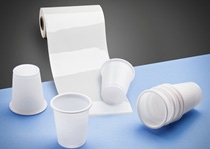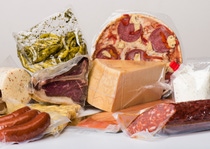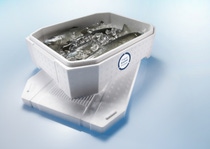MyIndustryWorld
BASF showcases solutions for the entire packaging life cycle at interpack 2020
- Increasing resource efficiency and the use of alternative feedstocks in production
- Providing additional benefits during the use phase
- Enabling circularity at the end of service life
At Interpack 2020, which is being held in Düsseldorf from May 7 to 13, BASF experts and specialists from BTC Europe, BASF’s European distribution organization, will present a wide range of plastics, dispersions for adhesives as well as resins and additives for printing inks and barrier coatings in hall 10, booth B43. Solutions focus on the entire life cycle of the packaging products, from production and use to recovery options at the end of their service life. They reduce the environmental footprint while remaining economically and socially viable.
Smart use of resources during production
In terms of production, the focus is on achieving process efficiency, product effectiveness and reduced emissions through the use of alternative feedstocks. BASF is planning to showcase products made from bio-based raw materials obtained from responsible sources as well as products made from recycled plastic waste. The use of alternative feedstock helps conserve fossil fuels, reduces greenhouse gas emissions and diversifies the product range. In addition, the mass balance approach ensures that more raw materials from organic waste and vegetable oils or plastic waste are used within BASF’s Verbund production system. Alternative feedstock is added at the very beginning of the Verbund production system and then allocated to the respective sales products using an independently certified method. The products are of the same quality and properties. Another showcased solution to reduce emissions are BASF’s water-based technologies. As an alternative to solvent-based technologies they improve occupational health and safety while reducing the CO2 footprint.
Added benefits during the use phase
During their use phase, packaging solutions have to ensure safe handling and reliably preserve the quality of the packaged goods. BASF solutions provide added benefits such as lower packaging weight, which reduces the amount of resources used and packaging waste generated. In addition, BASF materials maintain the safety and extended shelf life of packaged goods, an important factor for sensitive applications such as the packaging of fresh foods. At the same time, this helps to reduce food waste.
Tackling the end-of-life-challenges of packaging
At the end of its service life, the most appropriate recovery option should be chosen to manage packaging waste to keep it from being sent to landfills or incineration facilities. BASF will be exhibiting solutions for the chemical, mechanical and organic recycling of packaging products. BASF’s project ChemCycling™ focuses on chemical recycling to provide virgin-grade material based on recycled plastic waste, allowing the high-value recovery also for plastics for which there are currently no other recycling solutions or capacities are lacking. In terms of mechanical recycling solutions, BASF has developed special adhesives for flexible packaging that facilitate the separation of multi-layer structures. Furthermore, certified compostable materials make organic waste easier to collect and to recycle in large quantities. This counteracts the inefficiency and the greenhouse gases emitted by other disposal ways for organic waste. At the same time, high-quality compost or organic feedstock is produced that can be used for new products.
Read on for more information about specific products and innovations that BASF will present at interpack 2020.
New Ultradur® grades for thermoforming and injection-molding applications with tailor-made property profiles
The world’s first thermoformable PBT Ultradur® B6560 M2 FC TF combines all the characteristics of the Ultradur family while additionally providing excellent oxygen, water vapor and aroma barrier properties. Polymer chains are branched through the addition of special additives, creating a material with very high melt strength that can be processed by extrusion. The monomaterial product is thus the perfect choice for the extrusion of films, the thermoforming of packaging as well as for high temperature applications. Its excellent processability was confirmed by ILLIG Maschinenbau, a leading global supplier of thermoforming and mold systems for thermoplastics. Ultradur B6560 M2 FC TF offers good mechanical properties, is easy to color and can even be used for foaming. It allows the recirculation of the processing waste into the production chain, thereby minimizing the total amount of plastic waste generated during production.
Ultradur B1520 FC R1 is a high-flowability PBT that was specially developed for injection-molded packaging applications. The material has been certified for food-contact applications and can therefore be used for thin-walled packaging for cosmetics and food products. It is the product of choice for single-layer, aroma-sealed packaging. Secondary packaging is made redundant by Ultradur B1520 FC R1’s well-balanced barrier properties against moisture and oxygen. The packaging can also be very thin, which is a prerequisite for economic and ecological production. Therefore, Ultradur B1520 FC R1 means: less resources, less packaging waste.
Ultramid® Flex F38L: A partly bio-based copolyamide with outstanding properties
Ultramid® Flex F38L is a partly bio-based copolyamide with outstanding properties that cannot be achieved by conventional polyamides. Thanks to its softness and transparency even at lower temperatures, Ultramid Flex F38L is ideally suited for soft packaging, like soft vacuum and shrink bags. During production, Ultramid Flex F38L is soft without conditioning immediately after processing and absorbs 50% less water than polyamide 6. As its O2/CO2 transmission ratio differs from that of other polyamides, this grade is ideally suited for manufacturing cheese ripening bags. Ultramid Flex F38L is one of BASF´s contributions for the production of sustainable packaging. Locally grown rapeseed oil makes up about one-third of the raw materials used to produce the monomer.
Ultramid® Ccycled™ preC 3: Introducing a family of polyamide 6 extrusion resins made from 100% recycled pre-consumer waste
In response to customer requests for a wider range of materials with recycled content, BASF is introducing polyamide 6 extrusion grades sourced from recycled pre-consumer waste. These materials are obtained from production and process waste generated during the polyamide production at BASF and are broken down in a separate process to the level of the monomers of polyamide 6. This monomer can replace virgin monomer, thereby saving primary fossil raw materials and reducing CO2 emissions to levels below those emitted during incineration or landfilling. The mass balance approach is applied in the production of Ultramid® Ccycled™ preC 3. This approach ensures that the recycling grade is of the same quality as that of virgin materials. The recycling materials are certified by an independent third-party organization.
Styropor®: Increasing recycled content with ChemCycling™ products
With its ChemCycling™ project, BASF is taking an important step towards achieving a circular economy. Plastic waste that is not recycled mechanically can be broken down into its molecules and used as raw materials for sophisticated applications. During the pilot phase, Styropor® P Ccycled™ was even used for transport boxes for fresh fish, insulated packaging for temperature-sensitive pharmaceuticals and protective packaging for electronic devices. “These prototypes show that chemical recycling is able to produce virgin-quality material and, at the same time, facilitates the recycling of such materials as mixed plastic waste or other contaminated plastics that cannot be recycled mechanically for technical or economic reasons. Together with mechanical recycling, chemical recycling can also help to close the materials cycle and can contribute to increasing the number of high-performance products based on recycled raw materials,” says Klaus Ries, Vice President Business Management Styrenics at BASF.
Certified compostable biopolymers for cling film and paper coatings
The certified compostable plastic ecovio® can now also be used to manufacture cling films for the packaging of fresh foods. BASF will be presenting the first certified compostable cling film that combines optimal breathability, which extends the shelf life of fresh foods, with high transparency and excellent mechanical properties for automatic packaging. Meat, seafood as well as fruit and vegetables can be wrapped manually or using automatic packaging equipment. Industrial stretch packaging is also possible. After usage, the cling film can be composted together with any food waste either in home compost or industrial compost facilities according to national legislation. The cling film thus enables organic recycling and helps close the nutrient loop to achieve a circular economy.
The biopolymer ecovio can also be used for the coating of cups, plates and trays made of paper, cardboard or recycled paper. The grade ecovio PS 1606 is suited for applications in contact with hot, cold or fatty foods because of its excellent barrier properties. It is certified compostable in industrial composting facilities (EN 13432). Therefore, after consulting the local community waste management, the food service articles can be composted together with leftover food as organic waste. Thus, ecovio facilitates and increases the collection and recycling of food waste at public events.
Flexible packaging solutions with water-based Epotal® adhesives
BASF’s water-based Epotal® lamination adhesives are a sustainable alternative to solvent-based and solvent-less products. They represent a reliable option for manufacturers of flexible packaging on all performance levels. Their high initial bonding strength enables the immediate further processing of the laminates. Curing times are minimal, which means increased flexibility for the customer by significantly shortening lead times and enabling in-line printing and lamination. Due to their chemical composition, water-based adhesives are inherently safe systems and well suited for food packaging applications.
The Epotal portfolio also tackles the end-of-life challenges for flexible packaging. Epotal adhesives facilitate the recycling of multi-layer packaging materials by making the single layers of a packaging film easy to separate from each other within the recycling process. To achieve fully compostable packaging, Epotal Eco adhesives can be combined with paper, BASF’s biopolymer ecovio or other compostable polymers. The Epotal BLX line provides the means to create barrier coatings or adhesives for highly functional mono-material packaging, thereby facilitating the recovery and reuse of materials from plastic waste.
Customers can test these new water-based systems at BASF’s Adhesive Coating Center in Ludwigshafen to find the perfect solution for their individual coating challenges.
Solutions for packaging inks and barrier coatings with water-based Joncryl® resins
BASF’s comprehensive resins portfolio meets even the most stringent formulation requirements of ink, ink-receptive coating and overprint varnish manufacturers. The Joncryl® FLX portfolio has become established as the reference standard for resins used in water-based film printing inks. Combining excellent resistance and lamination bond strength with high resolubility, the performance of these water-based resins is similar to that of their solvent-based counterparts for printers and converters of flexible packaging. BASF’s Joncryl HSL product line offers a range of options for heat seal lacquers for various applications, providing secure seal and smooth peeling behavior. The Joncryl MB portfolio was developed as part of BASF’s biomass balance approach for water-based binders and helps to achieve significant savings in CO2 emissions without having to compromise on quality or performance.
BASF’s Joncryl HPB technology provides formulators with water-based polymers that are used in coatings for recyclable functionalized paper and paper board packaging solutions. These solutions include the Joncryl HPB system for recyclable, repulpable coatings that not only offer the same level of water resistance and heat sealability properties as current polyethylene extrusion coating layers but have also been approved for food contact. In digital printing, the Joncryl DPS portfolio includes a range of high-quality raw materials for water-based inkjet ink.
Further information
BASF at interpack 2020, including further information on our product portfolio: basf.com/interpack2020
BASF product line Ultradur: ultradur.basf.com; ultradurextrusion.basf.com
BASF’s biomass balance approach: basf.com/biomassbalance
BASF’s project ChemCycling: basf.com/chemcycling
BASF biopolymers: ecovio.basf.com; biopolymers.basf.com
About BTC Europe
BTC Europe belongs to the world’s leading chemical group, BASF – We create chemistry. BTC Europe GmbH is BASF’s European sales organization for specialty chemicals. Our strengths lie in our knowledge of the industry, based on many years of experience, and our proximity to our customers. With its 11 regional offices and more than 500 employees in Europe, BTC supplies small and medium-sized customers from a wide variety of industries with about 6,000 products. BTC is headquartered in Monheim am Rhein. Further information on BTC is available on the Internet at www.btc-europe.com
About BASF
At BASF, we create chemistry for a sustainable future. We combine economic success with environmental protection and social responsibility. More than 117,000 employees in the BASF Group work on contributing to the success of our customers in nearly all sectors and almost every country in the world. Our portfolio is organized into six segments: Chemicals, Materials, Industrial Solutions, Surface Technologies, Nutrition & Care and Agricultural Solutions. BASF generated sales of €59 billion in 2019. BASF shares are traded on the stock exchange in Frankfurt (BAS) and as American Depositary Receipts (BASFY) in the U.S. Further information at www.basf.com.
Contact us
Not found what you were looking for? Reach out to us for assistance.
Subscribe to our News-Service
Don’t miss the latest news on web seminars, sustainability, regulatory and product innovations.





